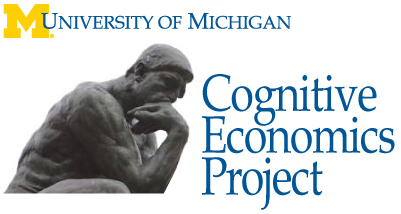Cognitive Economics Study
The Cognitive Economics Study (CogEcon) is designed to help understand the cognitive bases of economic decisionmaking. This effort was made possible through a partnership with the "Cognition and Aging in the USA" study (CogUSA), which is part of the Unified Studies of Cognition (CogUSC) led by cognitive psychologist Jack McArdle at the University of Southern California.
The Cognitive Economics Study has fielded four waves. The first wave, CogEcon 2008, collected information about income, work, assets and debts, financial sophistication, use of financial advice, among other topics. The second wave, CogEcon 2009, repeated many questions from CogEcon 2008 and contained new questions about changes during and responses to the financial crisis that started in late 2008. The third and fourth waves, CogEcon 2011 and 2013, repeated many questions from earlier waves and contained new questions about income taxes and health literacy. The fifth wave, CogEcon 2017, repeated some wealth measures and tested two other methods of wealth measurement. All waves of data are now publicly available.
CogEcon public use data can be merged with cognitive and demographic variables collected by CogUSA. Please see Section I.A.4. of the Data Documentation listed below for information about accessing the CogUSA data, and the CogUSC website has more information about the study.
Please email [cogeconproject AT umich DOT edu] with questions or concerns.
Questionnaires
These documents contain all questions from the CogEcon web and mail questionnaires. This includes the entire mail questionnaire, wording for alternative versions of the survey and questions that were fielded differently on the web.
- CogEcon 2008 (pdf)
- CogEcon 2009 (pdf)
- CogEcon 2011 (pdf)
- CogEcon 2013 (pdf)
- CogEcon 2017 (pdf)
Public Use Data Files
The CogEcon public release data are available through the Health and Retirement Study's data distribution system. There are currently two data products available, each containing a Stata data file and documentation. The first is the Public Core, which includes both CogEcon 2008 and CogEcon 2009, and the second is the CogEcon 2011 Public files.
Please see the Data page for more information about accessing CogEcon data.
Note to CogEcon 2011 users: Scores to financial sophistication questions have been updated as of May, 2015.
CogEcon 2008 & 2009 Public Core Data Documentation
These documents provide background information about the Cognitive Economics Study and should provide sufficient information for researchers to successfully use the CogEcon Public Use Core data files, which contain data from CogEcon 2008 and CogEcon 2009.
- Survey Design: (pdf) Describes survey development and methodology, including details about the sample.
- Data Documentation: (pdf) Describes how to access and use CogEcon Public Use data. This includes details about variable naming conventions and idiosyncrasies between mode (web and mail) and across waves, and an explanation of the Conditions of Use agreement.
- Compact Codebook: (pdf) Lists variable name, label and summary statistics for the core file containing data from CogEcon 2008 and CogEcon 2009.
- Codebook: (pdf) Full codebook from Stata.
CogEcon 2011, 2013, 2017 Public Data Documentation
These documents are the same as the ones above, but for the CogEcon 2011, 2013, and 2017 Public Data. Please reference the Survey Design documentation above for details about the survey development and methodology.
- 2011 Data Documentation V1.1 (pdf) (Corrected True/False for question B10)
- 2011 Compact Codebook V1.1 (pdf) (Updated summary statistics for financial sophistication variables)
- 2013 Data Documentation (pdf)
- 2013 Compact Codebook (pdf)
- 2017 Data Documentation (pdf)
- 2017 Compact Codebook (pdf)
